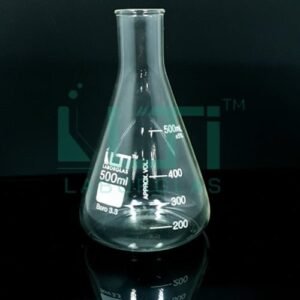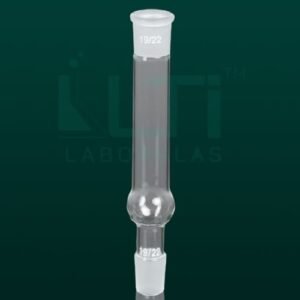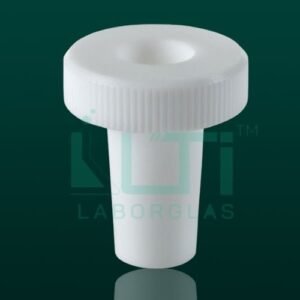As per ASTM standards E – 676
| Part No. | Male Joint | Approx. O.D. of Tube (mm) | Total Length (mm) | Pack QTY. |
| 1120-12M | 12/18 | 10 | 120±10 | 10 |
| 1120-14M | 14/20 | 13 | 120±10 | 10 |
| 1120-19M | 19/22 | 16 | 120±10 | 10 |
| 1120-24M | 24/25 | 22 | 125±10 | 10 |
| 1120-29M | 29/26 | 26 | 135±15 | 10 |
| 1120-34M | 34/28 | 30 | 135±15 | 10 |
| 1120-40M | 40/35 | 36 | 150±15 | 10 |
Here are some common uses for such joints in laboratory settings:
- Chemical Synthesis: Short-length male interchangeable joints are commonly used in chemical synthesis setups where different glassware components need to be connected securely for reactions, distillations, or other chemical processes. The short length can be advantageous in compact setups.
- Distillation and Fractionation: In distillation and fractionation setups, these joints can be employed to connect components such as distillation columns, condensers, and receiving flasks. The short length may be preferred in certain configurations to minimize dead space.
- Laboratory Glassware Assembly: Researchers often assemble custom glassware setups for specific experiments. Short-length male interchangeable joints allow for the flexibility to connect and disconnect various glass components easily, especially in setups with limited space.
- Vacuum Systems: Short-length joints are crucial in vacuum applications where a reliable seal is necessary. They may be used in vacuum filtration setups or other applications where minimizing the distance between components is important.
- Research and Development: Laboratories involved in research and development activities may use these joints for prototyping and testing new equipment. The interchangeability of the joints allows for experimentation and modification of configurations.
- Educational Laboratories: In educational laboratories, short-length interchangeable joints can be used for teaching purposes. They allow students to assemble and disassemble glassware setups for various experiments and demonstrations, providing a practical learning experience.
- Analytical Instrumentation: Some laboratory instruments and analytical setups may use short-length joints for connecting different components, ensuring precision and reliability in analytical techniques.







